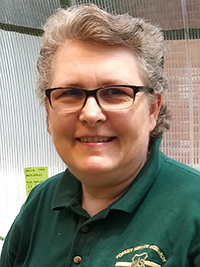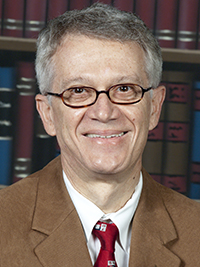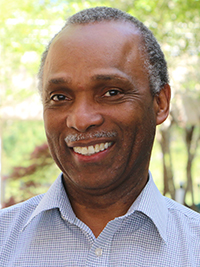Status bestowed upon members demonstrating extraordinary service to ESA
Annapolis, MD; August 24, 2022—In recognition of their long-term dedication and significant contributions to the Entomological Society of America (ESA), three entomologists have been selected as Honorary Members of the Society in 2022.
Honorary Membership acknowledges those who have served ESA for at least 20 years through significant involvement in the affairs of the Society that has reached an extraordinary level. Candidates for this honor are selected by the ESA Governing Board and then voted on by the ESA membership.
This year's honorees will be recognized during the 2022 Joint Annual Meeting of the Entomological Societies of America, Canada, and British Columbia, November 13-16, in Vancouver.
ESA's 2022 Honorary Members are:
- Melody Keena, Ph.D., U.S. Forest Service
- Walter Leal, Ph.D., University of California, Davis
- Alvin Simmons, Ph.D., USDA Agricultural Research Service
 Melody Keena
Melody Keena
U.S. Forest Service
Melody A. Keena received a B.S. (1983), M.S. (1985), and Ph.D. (1988) in entomology at the University of California, Davis, working on spider mite pesticide resistance management in the almond cropping system. From 1989 to 1992 she was a postdoctoral researcher at the University of Connecticut and has been a research entomologist with the U.S. Forest Service in Hamden, Connecticut, since 1992. As lead scientist for the laboratory in Connecticut, she has received several awards including an Editor's Choice Award, USDA Certificate of Appreciation and Special Act Awards, Quality Step Increases (twice), and Superior or Outstanding performance reviews 12 of last 15 years.
Her research focuses on developing the knowledge and tools needed for exclusion, eradication or control of non-native invasive forest pests and investigating basic biology, behavior, and population genetics. She has directed and mentored graduate students in their research as an adjunct, taught biology and ecology courses to business majors, and has several international collaborations. Dr. Keena has published 101 refereed papers or book chapters, presented 88 invited presentations (including keynote addresses to international entomological societies), and contributed an additional 125 presentations. She is considered an international expert on the biology and behavior of spongy moth and Asian longhorned beetle and is sought to review country-level risk assessments and provide webinars to train local managers on these insects.
Dr. Keena has been an active member of ESA, the Eastern Branch, and the Physiology, Biochemistry and Toxicology Section (formerly Section B, Integrative Physiological and Molecular Insect Systems) for 39 years (for the last 5 years also a member of Plant-Insect Ecosystems Section). She has presented, invited, or contributed talks at 34 ESA Annual Meetings and organized four symposia. She was encouraged by a supervisor to get involved in the Society in the early 1990s and has continued to be involved in one or more ways every year since. In the Eastern Branch she has served on and chaired several Branch committees including employment, finance, registration, auditing, resolutions, program, and student competition. She also served as the elected member-at-large on the Eastern Branch Executive Committee. While serving on the student competition committee, she developed improved judging sheets.
Her national committee service includes: membership (1997-99, chair last two years), finance (2002-07), program (2007, 2013-2015, co-chair last year), strategic planning (1999), technology (in 2004 helping premiere the first digital presentations and 2016 for the International Congress of Entomology), honors and awards (2009-11), systematic resources (2001-03), and presidential committees. While serving on the membership committee, she successfully presented proposals to start the family and transitional membership categories to the Governing Board. During her years on the finance committee, the Society went through turbulent times dealing with more than one executive director and the sale of ESA's office building to improve its finances. At the very successful 2015 annual meeting, she and her program co-chair developed the concept of organized meetings for groups regularly meeting with ESA and determined that presentations made in these meetings should not count against the conference presentation limit. As student competition co-chairs in 2014, they developed improved methods for tracking the student competitions. At the Section level, Keena was secretary, vice-chair, chair, and past chair of Section B (2005-08) and was subsequently elected as Governing Board representative (2009-11) for the newly named Physiology, Biochemistry, and Toxicology section during the section reorganization.
Dr. Keena served as a member and chair of the editorial board for the Journal of Integrated Pest Management (2011-2015), a physiological ecology subject editor for Environmental Entomology (2015–2019), and is currently co-editor-in-chief for Environmental Entomology (2019-present). As co-editor-in-chief of the journal, she has instituted the annual Reviewer's and People's Choice Awards, improved the diversity of the subject editor pool, overseen the creation of the very successful special collection on the spotted lanternfly, developed a new subject area and updated descriptions of the sections, and took the lead in creating an organized meeting for the journal (along with the Journal of Economic Entomology) at the ESA Annual Meetings where the award winners present an invited talk and the co-editors-in-chief can interact with members about the journals.
Throughout her career, Dr. Keena has encouraged many members and students to get involved in the Society, including actively participating in the Women in Entomology breakfasts, and she sees this as a critical part of any successful scientist's role in giving back to the Society and passing on the passion for entomology to the next generation.
 Walter Leal
Walter Leal
University of California, Davis
Walter Soares Leal, a distinguished professor at the University of California, Davis, is a world-renowned entomologist, educator, and researcher. A native of Brazil, he received his B. Eng. degree in chemical engineering from the Federal University of Pernambuco, Recife, Brazil; his M.Sc. in agricultural chemistry from Mie University, Japan; and his Ph.D. in applied biochemistry from the University in Tsukuba, Japan, with subsequent postdoctoral training in entomology and chemical ecology at the National Institute of Sericultural and Entomological Science and Cornell University, respectively. Leal joined the UC Davis faculty in 2000 and chaired the Department of Entomology from 2006 to 2008. He taught insect physiology for 15 years and currently teaches large-enrollment biochemistry classes.
He served as a councilor and president of the International Society of Chemical Ecology. Leal joined ESA in 1999. In 2019, when he received an ESA 20-year member pin and a letter saying, "THANK YOU for your continued support of ESA," Leal tweeted: "I should thank @EntsocAmerica for supporting my career for 20 years, not the other way around." For more than two decades, Leal has been very active in ESA affairs. He has organized symposia at the Annual Meetings; served as secretary, president, and past president of the ESA IPMIS Section (now PBT); and nominated colleagues for awards and elected offices. He organized more than a dozen Program and Section Symposia and included outstanding scholars and newly minted ESA members as speakers or co-organizers. These symposia included sponsored luncheons, social hours, and discussion sessions to promote interaction among attendees and speakers and build and cement collaborations.
He and Alvin Simmons (nominated by Grayson Brown and appointed by the Governing Board), co-chaired the 2016 International Congress of Entomology (ICE2016). The co-chairs served from 2010 to 2016 with seven ESA Presidents: David Hogg, Ernest Delfosse, Grayson Brown, Robert Widemann, Frank Zalom, Phil Mulder, and May Berenbaum. They prepared a 576-page bid, organized the program, promoted the Congress, and delivered one of entomology's most memorable events (6,682 registrants from 102 countries). Leal considers the enormous amount of time he dedicated to ICE2016 as "a highlight" of his career and "a justifiable sacrifice" to his research program. Today Leal serves as a member of the Council of the International Congresses of Entomology (CICE), a member of ICE2020 Helsinki LOC, and a Special Advisor (CICE Liaison) for ICE2024.
For the last 22 years, Leal's research program has been sponsored by the National Institute of Allergy and Infectious Diseases of the National Institutes of Health, the United States Department of Agriculture, the National Science Foundation, commodity groups, research agreements, and gifts from various donors. Leal has published more than 200 peer-reviewed papers in a variety of entomology and multidisciplinary journals, including the Proceedings of the National Academy of Sciences of the USA (PNAS), Nature, iScience, Journal of Medical Entomology, Insect Biochemistry, and Molecular Biology. His research, with an h-index of 61, has been cited more than 13,500 times. Leal's top three most-cited publications are a 2013 review on insect olfaction (Annual Review of Entomology, 1,084 citations); the first report of pheromone-binding protein structure (Chemistry & Biology, 502 citations); and the discovery of neurons sensitive to DEET (PNAS, 329 citations). Recently, Leal reported (BioRxiv, BIORXIV/2022/485336) on the structures of two odorant receptors and how they are narrowly tuned to the oviposition attractants skatole and indole.
Highly honored by his peers, Leal delivered ESA's 2019 Founders' Memorial Lecture on "Tom Eisner: An Incorrigible Entomophile and Innovator Par Excellence." He is an Honorary Fellow of the Royal Entomological Society (2015) and Fellow of the American Association for the Advancement of Science (2005), ESA (2009), and California Academy of Sciences (2015). He received both the Medal of Achievement (1995) and the Medal of Science (2008) from the Entomological Society of Brazil and the 1998 Gakkaisho from the Japanese Society of Applied Entomology and Zoology. The International Society of Chemical Ecology honored him with the Silverstein-Simeone Award (2007) and the Silver Medal (2012). In 2012, Leal was elected to the Brazilian Academy of Science (inducted in 2013). For his creativity in entomology, Leal received ESA's Nan Yao Su Award (2011) and was elected a Fellow of the National Academy of Inventors (2019). The UC Davis Academic Senate awarded him both the Distinguished Teaching Award (2020) and the Distinguished Scholarly Public Service Award (2022).
 Alvin Simmons
Alvin Simmons
USDA Agricultural Research Service
Dr. Alvin M. Simmons is a research entomologist at the USDA-Agricultural Research Service (ARS), U.S. Vegetable Laboratory in Charleston, South Carolina. Simmons received his B.S. in biology (East Carolina University, 1980), and M.S. (1983) and Ph.D. (1987) in entomology (University of Kentucky). Simmons leads two in-house USDA-ARS projects (one on vegetable entomology and another on food and ornamental research). Also, Simmons is the USDA-ARS coordinator for the Minor Use Pesticide Program for Food and Ornamental Horticulture; this program concerns field and laboratory research by USDA-ARS in cooperation with the national IR-4 Project to support the registration of all classes of pesticides for specialty crops (including fruits, nuts, vegetables, herbs, and floral).
Simmons has a research career of 42 years (35 years with USDA-ARS and seven years of graduate research). He has authored over 120 refereed journal articles, several book chapters, co-released five breeding lines, and provided over 300 technical reports resulting in over 200 pesticide labels. Simmons has provided vital information on addressing problems across a wide range of agricultural entomology, including plant resistance, bionomics, biocontrol, cultural control, biopesticides, insect-virus-plant relationships, and research in support of various technologies for whitefly management.
He has given invited talks to numerous domestic and international audiences and has traveled to 30 different countries. Simmons provides service in entomology by taking a very active role in scientific societies, conferences, workshops, consultation to the agricultural community, mentoring postdoctorates, mentoring graduate students, mentoring undergraduate students, and serving on numerous panels.
Simmons' service to ESA has been extensive and impactful. He has been a member of ESA since 1981 and has participated in 37 Annual Meetings and over 50 Branch Meetings. Inclusion has been his mantra since day one. His ESA service includes president of ESA; president of the Entomological Foundation (as final president, 2018-2019, after which key activities were incorporated by other ESA programs); president of the Southeastern Branch (SEB); co-chair of the 2016 International Congress of Entomology (ICE); co-chair of the Presidential Committee on ESA ICE Bid; chair of International Affairs Committee (a precursor to formation of the International Branch); 11 years on Entomological Foundation Board of Counselors; co-chair of Program Committee; co-chair of Local Arrangements and Technology Committee; chair of Science Policy Committee; Committee on Education and Youth; Committee on the Entomology Games (then called Linnaean Games); co-PI (Simmons & Oseto) on National Science Foundation Travel Grant for travel to ICE2000 (Brazil) ($50,000 awarded to ESA); organized and chaired numerous symposia; SEB Entomology Games judge (10 years); twice chair of SEB Program Committee, three times chair or co-chair of SEB Local Arrangement Committee; SEB chair of Nominating Committee; and SEB executive committee (presidential line and member-at-large). Simmons proposed and led SEB to include Puerto Rico as a Branch Meeting location so that local SEB members in Puerto Rico would have an opportunity to attend a local Branch Meeting (first time was in 2011 and second time was in 2022).
Simmons and his co-chair "twin," Walter Leal (University of California-Davis), worked intensely for two years to develop, in concert with others, a winning ICE2016 bid after gaining extensive domestic and international support. This was a massive impact because it had been 40 years (1976) since ESA hosted an ICE event; the only other ICE meeting held in the U.S. was in 1928. After ESA received the bid, co-chairs Simmons and Leal spent the next four years in extensive planning and promoting of ICE2016 at copious domestic and international events. With an inclusive theme (Entomology without Borders) that Simmons and Leal conceived for ICE2016, the co-chairs invited inclusively domestic and international people to help organize programing for all subjects of entomology. Over 160 researchers from 38 countries were selected by the co-chairs for the organizing committee. Nearly 6,000 presentations were given at ICE 2016, the largest gathering of entomologists in history (nearly 7,000 from 101 countries). In 2020, Simmons presided over the largest gathering of entomologists in a virtual setting (over 3,100 from 52 countries) under the inclusive theme "Entomology for All" when he served as the 2020 ESA President.
Among activities for other societies, Simmons is currently serving on the ICE2022 Organizing Committee, International Plant Resistance to Insects Steering Committee, and 2023 European Congress of Entomology Organizing Committee. Among Simmons' honors are Department of Entomology Distinguished Alumni Award, University of Kentucky (first recipient); IR-4 Meritorious Award; SEB Award for Excellence in IPM; Recognition Award in Entomology; Fellow of the Royal Entomological Society; and former president of South Carolina Entomological Society.
CONTACT: Joe Rominiecki, jrominiecki@entsoc.org, 301-731-4535 x3009
ABOUT: ESA is the largest organization in the world serving the professional and scientific needs of entomologists and people in related disciplines. Founded in 1889, ESA today has more than 7,000 members affiliated with educational institutions, health agencies, private industry, and government. Headquartered in Annapolis, Maryland, the Society stands ready as a non-partisan scientific and educational resource for all insect-related topics. For more information, visit www.entsoc.org.
